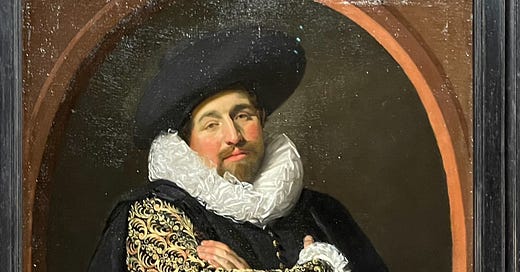We planned a side trip to Canterbury this year but the weather keeps arguing against it. London was dreary but occasionally dry today, threatening rain all day long. We opted for the National Gallery.
I keenly enjoy the Dutch painters of the 17th century because of their skill with light, especially on faces. The current Frans Hals exhibit was an easy answer for me, though my artist-in-home prefers water colours. We chose the Hals as a guarantee we could skip the long queues to enter the free collection should rain materialize.
What a brilliant move because Hals’s mastery of the humanity in the Low Country was staggering. I have no idea how he could capture the detail as clearly as he did for the elaborate attire of the Dutch golden age; layers upon layers of intricate white lace neckpieces above black coats or dresses with nuanced designs. I only took a single photo but the gold on the sleeve of his coat seemed to leap off the painting into my camera. Be still, my bearing heart. I wanted so badly to touch the gold brocade but was restrained.
The painting I regret bringing to you is my real topic today. The exhibit mentions that Hals’s work was not entirely wealthy patrons whose ostentatious lifestyle papered over the wickedness of lower class conditions (I, rather than the curator, emphasize that latter clause). The exhibition had one remarkably hoi polloi painting of a common musician with an instrument created by stretching the stomach of some creature across the top of a contraption to create a drum. He is surrounded by five- or six-year old children, the entire group looking relatively cheerful.
The painting made me wonder about the lives those folks led. I confess I have a Dutch line in my background but I know nada, zilch, nothing about them or where they originated. I imagine the lives the average person on the streets of Haarlem, the
Keep reading with a 7-day free trial
Subscribe to Actions create consequences to keep reading this post and get 7 days of free access to the full post archives.




